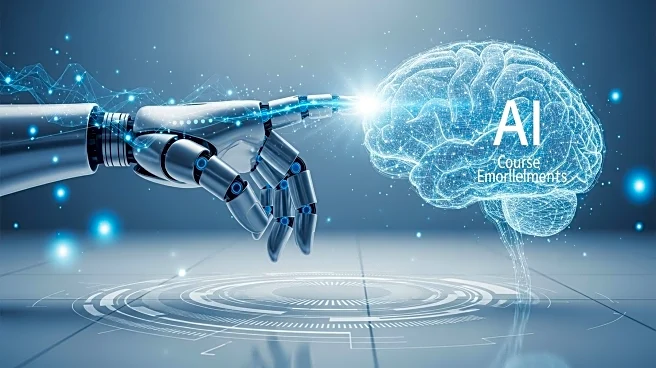What's Happening?
Udemy, a leading online learning platform, has reported a significant increase in enrollments for AI-related courses, with a fivefold surge over the past year. This trend is highlighted in Udemy's 2026 Global Learning and Skills Trends Report, which notes that AI enrollments have surpassed 11 million globally. The demand for AI proficiency is driven by the rapid obsolescence of skills, with professionals recognizing the need for continuous learning in an AI-driven world. Udemy's CEO, Hugo Sarrazin, emphasizes the shift towards lifelong learning, likening it to a 'Netflix for education' model. The platform's growth is reflected in its reported revenue of $199.9 million for the second quarter of 2025, marking a 3% increase from the previous year.
Why It's Important?
The surge in AI course enrollments underscores a broader shift in the education and workforce landscape, where continuous skill development is becoming essential. As AI technologies evolve, industries are increasingly seeking employees who can effectively utilize AI tools while critically assessing their impacts. This trend is reshaping corporate training budgets, moving from traditional annual events to integrated, ongoing skill-building. The emphasis on AI fluency and critical thinking is particularly relevant for Gen Z, who prioritize adaptive skills in the workplace. However, experts caution against over-reliance on AI, highlighting the need for responsible deployment and the importance of foundational education in developing critical thinking and innovation.
What's Next?
As AI continues to integrate into educational and professional settings, institutions and companies are expected to adopt more AI-driven learning tools. Udemy's AI Role Play, which allows users to practice real-world scenarios, is an example of how AI can enhance learning experiences. The focus will likely remain on balancing AI's potential with the need for human-centered education, ensuring that technology complements rather than replaces traditional learning methods. The ongoing challenge will be to maintain educational quality and equity, avoiding biases and ensuring that AI tools are used responsibly to benefit all learners.
Beyond the Headlines
The integration of AI in education raises ethical and cultural considerations, particularly regarding data privacy and the potential for reinforcing existing inequalities. As AI becomes a standard part of learning, institutions must ensure that their systems are transparent and accountable. The shift towards AI-enhanced education also suggests a cultural change, where learning is viewed as a lifelong pursuit rather than a finite achievement. This perspective aligns with the idea of 'skill fitness,' where continuous learning is necessary to keep pace with technological advancements.











